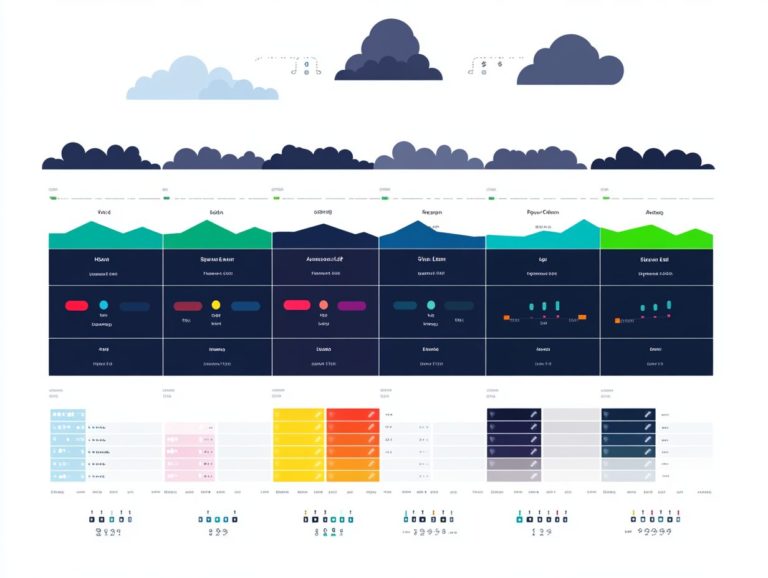Choosing Between Azure and GCP: Key Differences
In today s rapidly evolving digital landscape, cloud computing has become essential for you as a business seeking efficiency and scalability. Ready to find the perfect cloud solution for your business? This article delves into two of the leading cloud service providers: Microsoft Azure and Google Cloud Platform.
By examining key differences in cost, features, security, and integration, the aim is to help you in the decision-making process. Real-world case studies will showcase how companies like yours have successfully used these platforms to achieve their goals.
Dive in to discover which cloud solution might be the perfect fit for your business.
Contents
- Key Takeaways:
- Key Differences Between Azure and Google Cloud Platform
- Factors to Consider When Choosing Between Azure and GCP
- Case Studies: Companies that Use Azure or GCP
- Frequently Asked Questions
- What are the key differences between Azure and GCP?
- Which platform is better for businesses with a tight budget?
- What type of support is available for each platform?
- Which platform is better for data analytics and processing?
- How do the security features of Azure and GCP compare?
- Can I use both Azure and GCP together?
Key Takeaways:
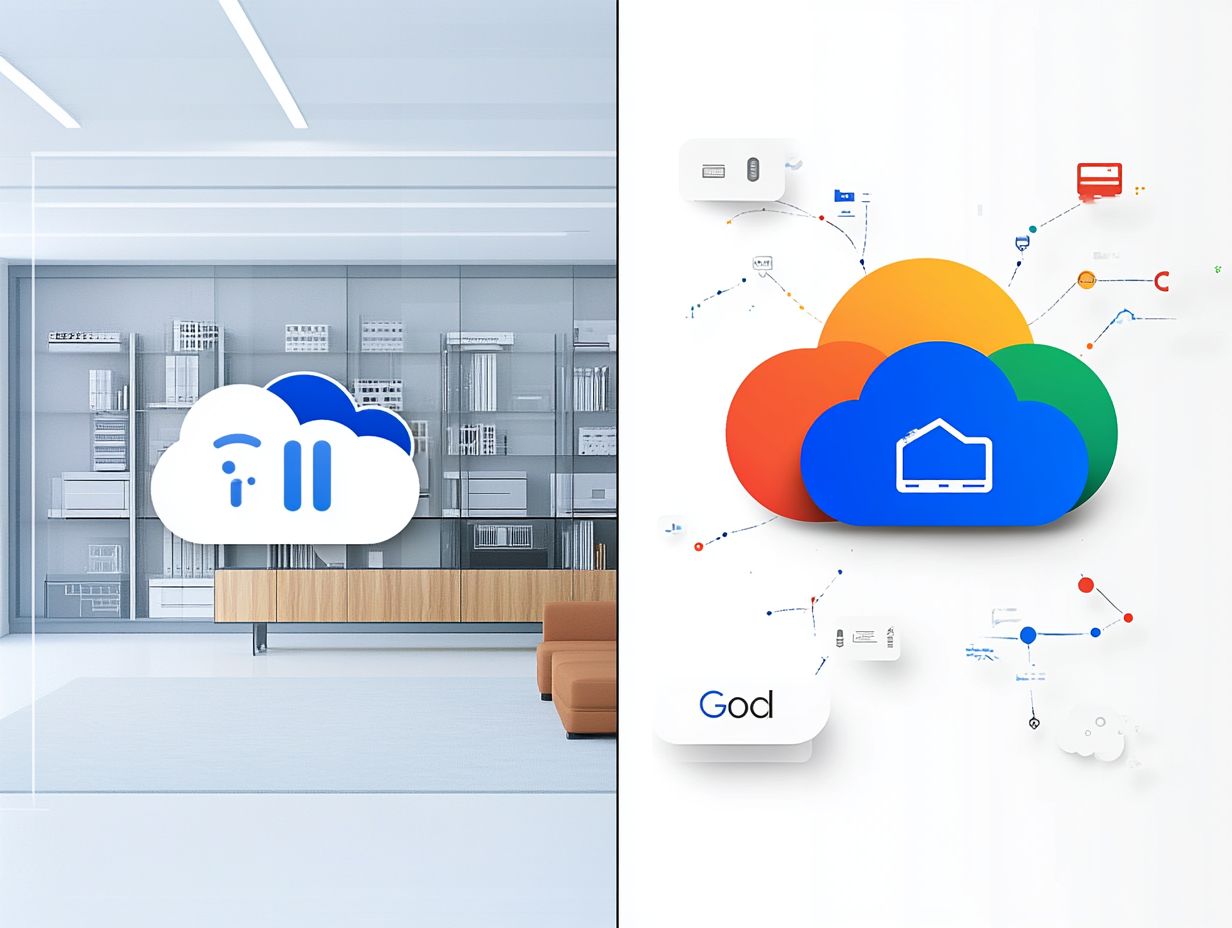
Azure and Google Cloud Platform offer different features and services, so think about what your business needs before choosing between them. Azure is known for its integration with existing systems, while Google Cloud is praised for its cost-effectiveness. Consider your technical expertise and budget when making a decision.
Companies like Coca-Cola and PayPal have successfully implemented Azure and Google Cloud, respectively. Learn from their success stories and consider the lessons they have learned when making your own decision.
Overview of Cloud Computing and Major Players
Cloud computing represents a revolutionary shift in how you manage and deliver IT resources. It allows your business to use on-demand resources via a network of remote servers hosted on the Internet. This model reduces operational costs, enhances scalability, and facilitates seamless migration, significantly improving your digital operations.
Major players in this space include renowned cloud service providers like Amazon Web Services, Microsoft Azure, and Google Cloud Platform, each offering unique services tailored to meet your diverse needs, from infrastructure maintenance to application hosting and compliance with various standards.
The significance of adopting cloud computing cannot be overstated; it provides the flexibility and efficiency required in today s fast-evolving digital landscape. You can easily scale your operations as needed, optimizing resources to adapt to demand fluctuations.
AWS stands out with its extensive range of services and strong market presence. Azure integrates smoothly with Microsoft products, making it an appealing choice if you’re already invested in Microsoft solutions. Google Cloud, on the other hand, is celebrated for its data analytics and machine learning capabilities ideal if you’re looking to innovate.
Enterprises like Netflix use cloud services to manage massive video streaming workloads, while Toyota leverages these platforms to enhance their connected vehicle technology. These examples showcase the transformative potential of cloud solutions in real-world applications.
Key Differences Between Azure and Google Cloud Platform
When you assess cloud options, grasping the distinctions between Microsoft Azure and Google Cloud Platform is vital for making informed decisions that align with your business objectives and customer demands.
Azure presents a comprehensive suite of services, especially advantageous for enterprises already integrated with Microsoft tools. On the other hand, Google Cloud excels in its focus on data analytics and machine learning capabilities.
While both platforms offer competitive pricing models, their strategies for scalability, data management, and service offerings are tailored to meet different operational needs. This ultimately influences the overall operational costs for you as a user.
Don t wait! Start exploring your cloud options today!
Cost Comparison
Cost comparison between Azure and GCP is essential if you aim to optimize your cloud expenditure while effectively meeting your business objectives.
Both platforms offer diverse pricing models. These include pay-as-you-go options that let you manage costs based on usage.
Understanding the nuances in pricing structures, including data transfer costs and additional fees for specialized services, is essential for making smart decisions during your cloud migration.
For instance, Azure presents various pricing tiers for services like virtual machines and storage. Costs can start from just a few cents per hour for basic workloads, escalating to higher rates for more robust configurations.
Conversely, GCP provides custom machine types that help you minimize expenses by only charging for the exact resources you provision.
If you re looking to maximize your savings, it s not just about comparing these service costs. You should also evaluate the commitments for reserved instances or sustained use discounts that both platforms offer.
By strategically utilizing these options, you can significantly lower your cloud costs while ensuring your applications perform adequately.
Features and Services
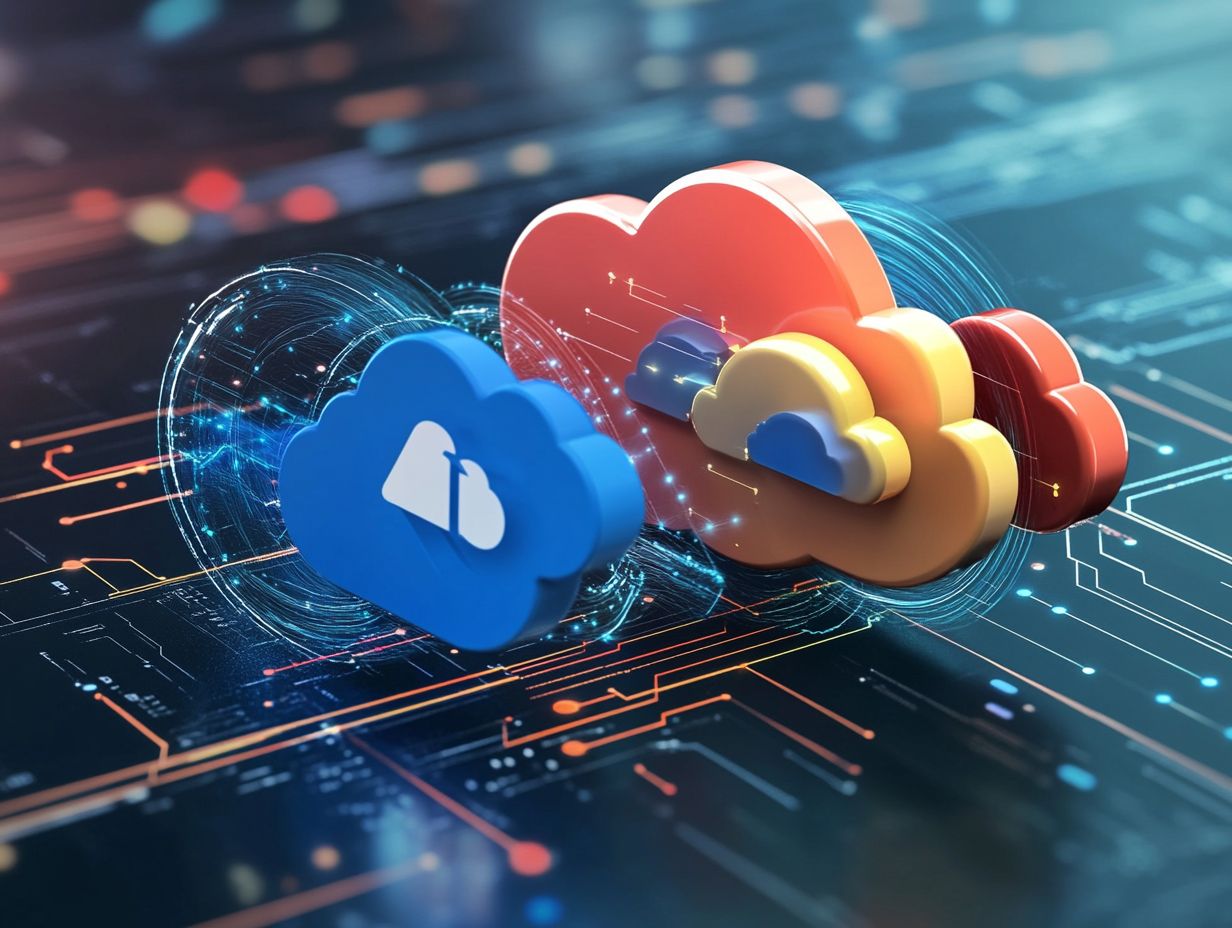
The features and services offered by Azure and GCP play a crucial role in determining their fit for your business needs, whether you’re seeking basic infrastructure as a service (IaaS), where you rent IT infrastructure, or platform as a service (PaaS), which lets you build and deploy applications.
Azure shines when it comes to integration with Microsoft products, making it a perfect match for enterprises that rely heavily on existing software solutions.
On the other hand, GCP stands out with its remarkable capabilities in big data analytics and machine learning ideal for businesses that prioritize innovation.
Both cloud service providers also offer containerization and edge locations, which enhance their application hosting capabilities.
These advantages translate into real-world applications. For instance, Expedia utilizes Azure’s robust data management for its travel solutions, benefiting from seamless integration with its existing Microsoft software.
Meanwhile, Coinbase harnesses GCP’s machine learning tools to ensure secure and efficient cryptocurrency transactions.
Regarding IaaS, Azure’s wide range of virtual machine offerings caters expertly to enterprises, while GCP s focus on high-performance computing truly shines.
In the PaaS arena, Azure’s App Service provides a user-friendly platform for web app deployment, while GCP’s App Engine offers the flexibility of scaling as needed.
For SaaS, both platforms boast powerful collaborative tools, yet each appeals to different organizational needs, demonstrating how their unique features align with varied strategic objectives.
Security and Privacy
Security and privacy are top-tier concerns for businesses leveraging cloud services. Both Azure and GCP are dedicated to delivering robust cybersecurity solutions that protect your sensitive data.
Each platform has established compliance requirements that align with industry standards, ensuring you can navigate regulatory frameworks while managing operational costs effectively.
Azure s wide range of compliance options and GCP s innovative security features are essential differentiators in the competitive landscape of leading cloud service providers.
In today s digital age, strong security is more critical than ever. Both Azure and GCP are committed to protecting your data, helping you maintain trust with your customers.
Azure provides a comprehensive suite of identity and access management features, while GCP utilizes advanced machine learning techniques for threat detection, fostering a proactive cybersecurity approach.
This emphasis not only bolsters the platforms security postures but also enables you to invest more confidently in cloud solutions. Ultimately, this can influence your operational costs and help maintain regulatory compliance without sacrificing safety.
Factors to Consider When Choosing Between Azure and GCP
Choosing the right cloud service provider requires careful examination of several critical factors, such as your unique business needs and technical capabilities. You should also consider how well the service can connect with your existing systems.
Azure and GCP each offer distinct advantages tailored to different customer requirements. It s crucial for you to assess your business expenses, scalability demands, and the specific service offerings of each platform before moving your data and applications to the cloud.
Understanding these factors helps you enable your organization to select a solution that aligns with your strategic goals and enhances your digital operations.
Business Needs and Goals
Understanding your business needs and goals is essential when choosing between Azure and GCP. Each platform brings its own unique features that can impact your operational costs and overall efficiency.
You need to assess your specific customer requirements, whether you prioritize cost savings or scalability. Consider cutting-edge solutions like machine learning and big data analytics as well.
Aligning cloud solutions with your business objectives allows you to make informed decisions that drive growth. For example, if you re running a retail chain focused on enhancing customer engagement, you might gravitate toward Azure due to its seamless integration with Microsoft tools.
On the other hand, if you re a startup in finance, GCP s advanced data analytics capabilities may be beneficial for processing large volumes of transaction data.
By recognizing these nuances, you can select a cloud provider that meets your unique demands. This could involve ensuring high availability for e-commerce platforms or maintaining compliance in regulated industries.
This strategic alignment boosts operational efficiency and optimizes resource allocation, leading to better cost management and faster outcomes.
Technical Expertise
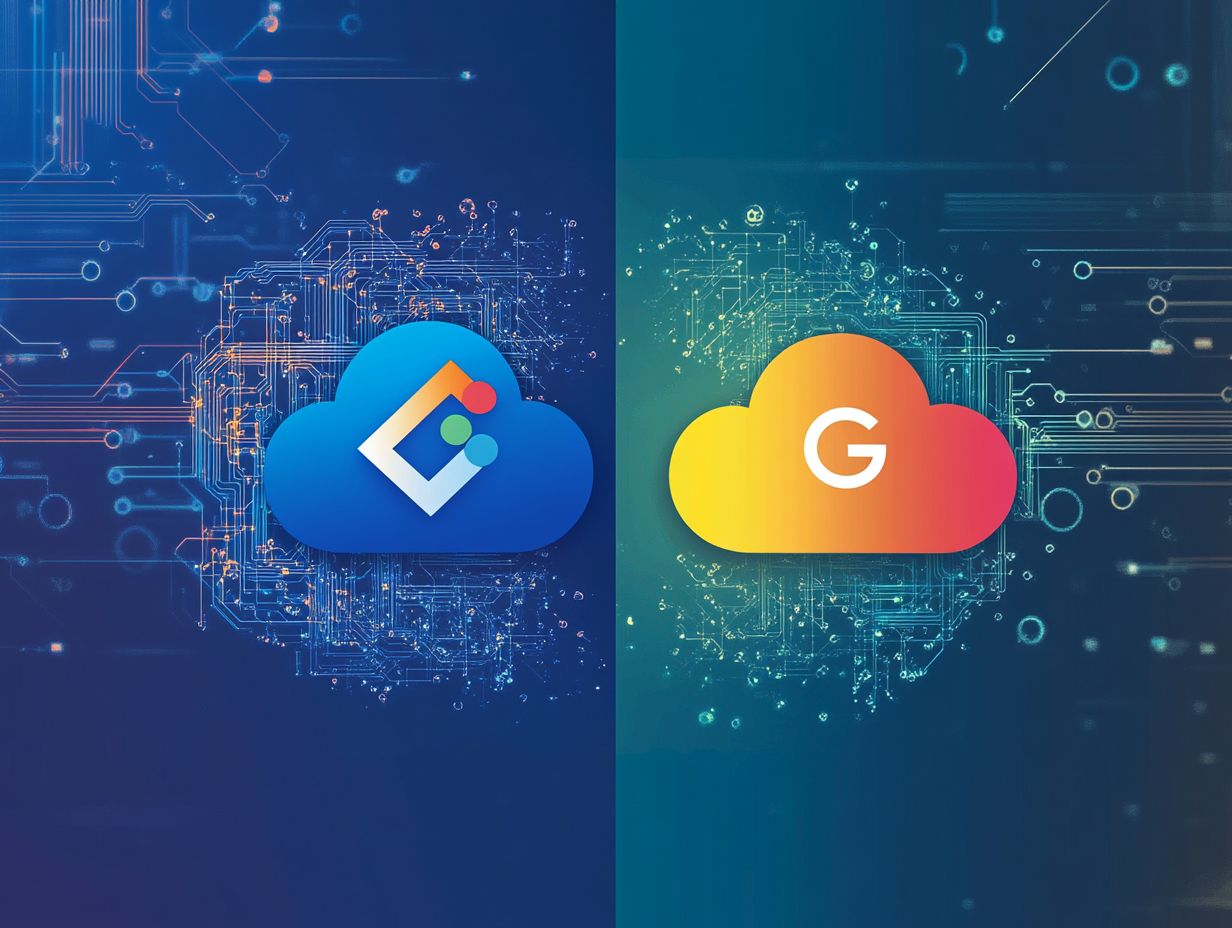
Technical expertise is crucial for successfully implementing cloud solutions. It guides how your organization navigates the complexities of Azure and GCP.
If your team possesses in-house skills, integration and management of your cloud environments can be seamless. Conversely, lacking technical knowledge may present challenges during migration, risking increased business expenses.
Evaluating your team’s technical capabilities is essential for determining which platform aligns best with your needs. Investing in training and development can greatly enhance your team’s proficiency.
By addressing skill gaps, you streamline migration processes and optimize your cloud infrastructure for scalability. This improvement fosters a culture of innovation within your organization.
Ultimately, it ensures a smoother transition to cloud environments that meet your evolving business demands.
Integration with Existing Systems
The ability to seamlessly connect with existing systems is crucial when choosing between Azure and GCP. It can significantly impact your business expenses and overall efficiency.
Azure excels in compatibility with Microsoft products, providing a smoother transition for businesses already using those tools. On the other hand, GCP offers robust APIs and supporting services for varied environments.
If your company relies on Microsoft Office 365, Azure’s integration capabilities can create a cohesive user experience. Conversely, a tech firm using open-source tools could benefit from GCP’s versatile integrations.
Each platform has its challenges; Azure may present difficulties for non-Microsoft environments, while GCP might require additional configuration for legacy systems.
Therefore, evaluating these integration factors is essential for any organization looking to optimize its systems and effectively reduce costs.
Case Studies: Companies that Use Azure or GCP
Examining case studies of companies using Azure or GCP provides valuable insights. These examples show the practical applications and unique offerings of these cloud platforms.
For example, Netflix uses AWS for its data storage and streaming. Meanwhile, companies like Expedia and Coinbase leverage Azure for its integration with Microsoft tools and data analytics.
These real-world examples highlight how cloud solutions support diverse business objectives and enhance operational efficiencies through transitioning to cloud services.
Success Stories and Lessons Learned
Success stories from enterprises that have made the leap to Azure or GCP showcase the real benefits and valuable lessons learned throughout their cloud journeys. For instance, Toyota effectively utilized Azure s offerings to streamline operations and cut costs.
Conversely, companies like Unilever have tapped into GCP s data analytics capabilities to drive innovation. These case studies illuminate not just the perks of embracing cloud solutions, but also deliver critical insights into the hurdles faced and strategies deployed during the migration process.
Organizations often face challenges like high data transfer costs and the headaches of integrating legacy systems. Toyota tackled these issues head-on by adopting a phased migration approach, allowing them to adapt and optimize their processes gradually without disrupting operations.
Meanwhile, Unilever took a proactive stance by building a robust training program for their team, ensuring everyone had the skills needed to fully utilize GCP’s tools for real-time data analysis.
The end results for these companies included enhanced agility, improved operational efficiency, and significant cost savings. By learning from these experiences, other organizations can navigate their own cloud transitions more effectively, adopting flexible strategies and prioritizing team training to ensure successful implementations.
Frequently Asked Questions
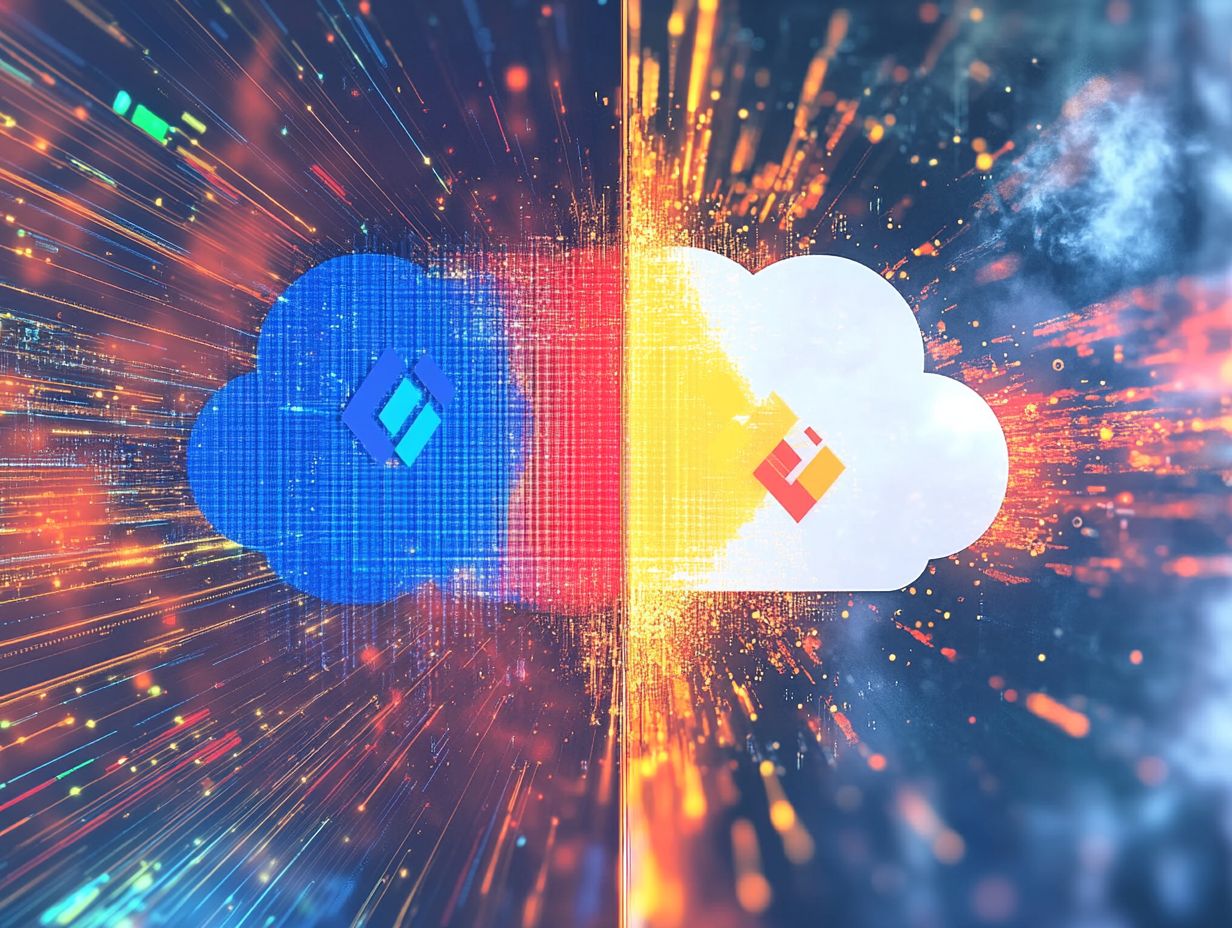
What are the key differences between Azure and GCP?
Azure works better with Windows apps, while GCP excels in open-source environments. Azure offers a larger range of services, but GCP is known for its advanced machine learning capabilities. Lastly, Azure has a larger market share and more global data centers compared to GCP.
Which platform is better for businesses with a tight budget?
Both Azure and GCP offer pay-as-you-go pricing models, making them affordable for businesses of all sizes. However, GCP is generally considered more cost-effective due to its lower pricing for certain services and discounts for long-term commitments. Azure, on the other hand, offers more flexibility in pricing plans.
What type of support is available for each platform?
Azure and GCP both offer comprehensive support options, including online resources, forums, and customer support. Azure has a dedicated customer support team available 24/7, while GCP offers support during business hours only. Additionally, Azure provides a paid support plan for more advanced options.
Which platform is better for data analytics and processing?
Both Azure and GCP offer powerful data analytics and processing capabilities. However, GCP is generally considered to be better for data analytics due to its advanced machine learning tools and data processing engines. Azure is also a strong contender, with its Azure Machine Learning service and Azure Data Lake Storage.
How do the security features of Azure and GCP compare?
Both Azure and GCP have strong security features, including data encryption, identity and access management, and compliance certifications. However, Azure offers more advanced security tools, such as Azure Security Center and Azure Key Vault, while GCP emphasizes data privacy and compliance.
Can I use both Azure and GCP together?
Yes, you can use both Azure and GCP by leveraging multiple cloud services. This approach offers flexibility and can save costs while helping you avoid being locked into a single vendor.
However, managing different platforms can be complex. It’s crucial to evaluate your business s needs and resources before diving into a multi-cloud strategy. Don’t miss out on the benefits!

